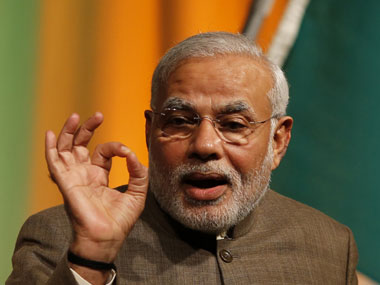As Prime Minister Narendra Modi on Monday launched India’s first ever national air quality index to monitor pollution levels in ten cities in the country, he said that environment protection is a part of Indian culture that has been practised for a long time by our ancestors. [caption id=“attachment_2186059” align=“alignleft” width=“380”] PM Narendra Modi said that lies about the land bill were being spread around. Reuters[/caption] Speaking at the inauguration of a two-day conference of State Environment and Forest Ministers in New Delhi, Modi said, “We belong to a tradition whether nature is considered to be sacred and has a deep bond with humanity…we have been worshipping trees and plants for a very long time.” Modi also took a dig at the Opposition for targetting the land acquisition bill and said that the bill had nothing to do with the land belonging to adivasis or people living in jungles. “There are a lot of misconceptions being spread about the land bill. “Not a single word in the land bill refers to adivasis’ land or the land of people living in jungles,” Modi said. “Therefore, such land does not come under land bill. Some people are spreading lies and trying to delude the country. This practice of misleading people of the nation must end.” Talking about India’s contribution to environment protection in the world today, the PM said, “We have the least contribution to carbon emissions in the world.” “The world has still not found solutions to global warming and carbon emission,” said Modi. “We are not ready to change our lifestyle while addressing problems of global warming and carbon emissions…Until we do that, we cannot solve such problems.” “The world’s perception is that India is not bothered about environment protection and climate change,” said Modi, adding that this perception could only change if the people in India changed their lifestyle and practised age-old traditions for environment protection. Referring to such a change in lifestyle, Modi said, “If our urban bodies decide that they will not switch street lights on during a full moon night, we will save a lot of energy.” Modi also said that recycling and reusing were old practices in India. He said that Indians knew that plants had life long before Jagdish Chandra Bose discovered that plants have life. “Since the time of the Gita and the Mahabharata, we have believed that plants had life,” said the PM. “We need to go in the direction for the creation of an environment for protection and worship of nature…There should be an environment in our schools that encourages nature conservation,” said PM Modi. “It should be India taking the initiative to save the world from the threat of climate change…Some people think development and environment are opposite. This thought is wrong. Both can happen at the same time,” he added. Modi also talked about creating pressure in the world for allowing India to harness civil nuclear energy. “If we tell the world we want to go forward in civil nuclear energy, we are denied permission,” he said. “We will put pressure on the world to provide India permission for civil nuclear energy.” He also talked about the importance of solar and wind energy. “India is a country with great potential when it comes to solar energy and wind energy. We need to harness this potential,” he said. Stressing on effective waste management, Modi also said, “To create wealth out of waste is a big venture these days, we need to focus on waste management.” “Waste management can be used to make better fertilisers which will give a better crop yield for our farmers. Better crop yield will mean better health for the people and a reduction in the cost of budget for the health sector,” said the prime minister. Modi also talked about the importance of cleaning Ganga, saying that it would create better global perception of India. “The people in the towns and cities located on the banks of river Ganga are closely linked with the Clean Ganga campaign…If we stop the pollution of Ganga, we can create a trust with the world that India can protect the environment,” he said. The Prime Minister also spoke about the rising tiger population in the country. “I came to know that the population of tigers went up by 40 percent in India. This is a matter of great pride for us, especially since two-thirds of the global population of tigers is in India and this global population is on the decline,” he said.
As PM Modi launched the air quality index to monitor pollution levels in ten cities, he said that environment protection is a part of Indian culture.
Advertisement
End of Article


)

)
)
)
)
)
)
)
)



